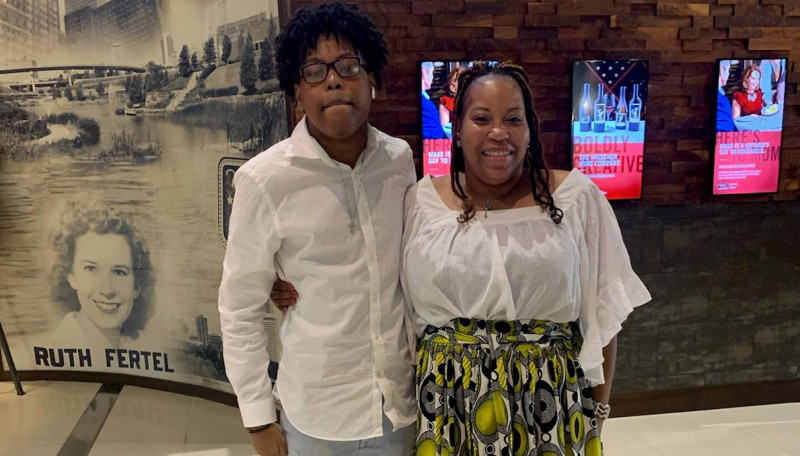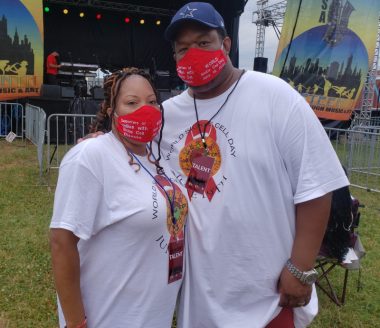Mother Creates Oklahoma Sickle Cell Nonprofit to Give Families Hope
Written by |

Photo courtesy of Velvet Brown-Watts
Velvet Brown-Watts with her 16-year-old son, Jeremiah Watts Jr.
Velvet Brown-Watts was devastated when her son, Jeremiah Watts Jr., now 16, was diagnosed with sickle cell disease in 2004 at 2 months old.
“It was probably one of the worst things I ever heard,” Brown-Watts, 46, told Sickle Cell Disease News. Doctors at the time told her there was no cure. “It was really devastating to our family. And it really does change the core of who you are and who you will become.”
A year later in 2005, Brown-Watts channeled her grief and difficulty finding the right care for her son toward starting the community-based organization Supporters of Families with Sickle Cell Disease to help improve the quality of life for the estimated 1,500 Oklahomans living with sickle cell disease and thalassemia, another inherited bleeding disorder.
When the state of Oklahoma had a budget shortfall and stopped funding the Sickle Cell Disease Association of America Oklahoma chapter in 2009, Brown-Watts’ organization stepped in to take its place as a center of referral and community-based information services for patients with the disease. Brown-Watts took the role of executive director, which fit her experience well.
The impetus to start the organization came in the form of a letter from the Oklahoma State Health Department, informing her family that their child’s hemoglobin test done as part of the newborn screening program came back abnormal and they would need to do a confirmatory test in six months. The news caught them by surprise.

Photo courtesy of Velvet Brown-Watts
Velvet Brown-Watts with her husband, Jeremiah Watts, at a Juneteenth celebration.
Brown-Watts knew she had the sickle cell trait at 5 years old. She was told by her husband’s mother when they got married that he did not have the trait. However, Jeremiah Watts did have the trait, meaning their son had a 25% chance of getting sickle cell disease.
“I was going through a tunnel, just a really dark tunnel, not seeing the light,” said Brown-Watts, who currently lives in Tulsa with her son and husband.
The diagnosis has been tough on her son too as he gets older and can’t do the same activities as those without the disease, she said. Jeremiah Jr. has had severe complications with his kidney and may have to be put on the transplant list.
However, various types of therapy, including supplemental oxygen, the oral medication Oxbryta (voxelotor), and supplements like folic acid are improving his quality of life and maintaining his energy levels.
Brown-Watts’ experience navigating the healthcare system and finding reliable information about the disease after her son’s diagnosis led her to start Supporters of Families with Sickle Cell Disease with five other families. Also helpful was her master’s degree in social work administration and community development from the University of Oklahoma.
“They give you all this information, and it doesn’t necessarily give you hope,” Brown-Watts said. “And that’s one of the things that our organization does; we give people hope, and we give them the diagnosis.”
According to Brown-Watts, her group is the only community-based organization contracted with the Oklahoma State Department of Health and the Oklahoma Health Care Authority. The health department also partially funds the organization so it can provide resources, including Camp Cavett, a sickle cell disease camp for children; education, accomplished through its recent World Sickle Cell Day event, Black Health Counts, on June 19; and connections between clinicians, families, and individuals.
While taking care of her son for the past 16 years, Brown-Watts has run into the problem of decentralized and disjointed care. Jeremiah sees four specialists across the state. So the organization’s recent project seeks to centralize care for patients through a hub-and-spoke system. Brown-Watts’ objective is shared responsibility, where the patient, community-based organization, and medical team work together to provide the best health outcome.
“Our goal is to empower our families to become the best health advocate they can for themselves,” Brown-Watts said.
The Black Health Counts event included an educational presentation to help families better understand sickle cell disease; a speaker’s forum with state health and safety employees, professors, and nonprofit leaders; and a free health screening. Supporters of Families with Sickle Cell Disease also provided COVID-19 vaccines, antibody testing, COVID-19 testing, and community education vendors on-site.
“The existence of health is the backbone to everything we do. If you don’t have your health, you’re not able to do things,” Brown-Watts said. “You’re not able to create businesses and various things within your communities and build as you would like.”
Her organization recently launched a campaign called “Sickle Cell Looks Like You, Sickle Cell Looks Like Me,” which provides education in underserved and underrepresented communities, disperses surveys for patients, providers, and parents to help create a uniform sickle cell plan for those diagnosed with the disease in Oklahoma, and dispels myths about the impact of sickle cell disease.
“It’s a real disease. The pain that patients live with is real,” Brown-Watts said. “The family deserves support.”





